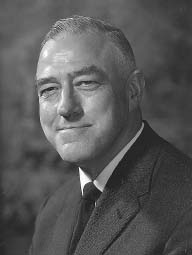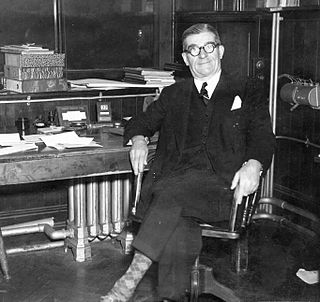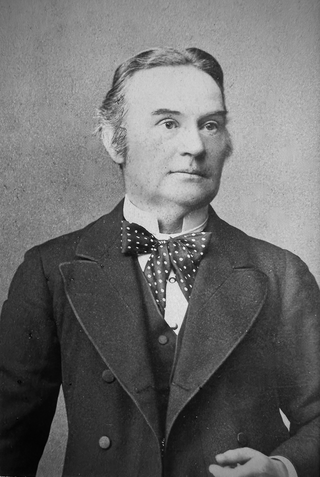Related Research Articles
Martin Henry Dawson was a Canadian researcher who made important contributions in the fields of infectious diseases.

Sir Thomas Clifford Allbutt KCB, MA, MD, ScD, FRS was an English physician best known for his role as president of the British Medical Association 1920, for inventing the clinical thermometer, and for supporting Sir William Osler in founding the History of Medicine Society.

Sir Michael Francis Addison Woodruff, was an English surgeon and scientist principally remembered for his research into organ transplantation. Though born in London, Woodruff spent his youth in Australia, where he earned degrees in electrical engineering and medicine. Having completed his studies shortly after the outbreak of World War II, he joined the Australian Army Medical Corps, but was soon captured by Japanese forces and imprisoned in the Changi Prison Camp. While there, he devised an ingenious method of extracting nutrients from agricultural wastes to prevent malnutrition among his fellow POWs.

Prof Arthur Gamgee FRS FRSE was a British biochemist.
The Sir William Dunn School of Pathology is a department within the University of Oxford. Its research programme includes the cellular and molecular biology of pathogens, the immune response, cancer and cardiovascular disease. It teaches undergraduate and graduate courses in the medical sciences.

Sir Robert Muir was a Scottish physician and pathologist who carried out pioneering work in immunology, and was one of the leading figures in medical research in Glasgow in the early 20th century.

Sir William Overend Priestley was a British physician and Conservative Party politician. He served as Member of Parliament (MP) for Edinburgh and St Andrews Universities from 1896 to 1900.

Sir James Rögnvald Learmonth (1895–1967) was a Scottish surgeon who made pioneering advances in nerve surgery.

Joseph Warwick Bigger was an Irish politician and academic. He was an independent member of Seanad Éireann from 1947 to 1951.

Charles Frederick William Illingworth was a British surgeon who specialised in gastroenterology. Along with a range of teaching and research interests, he wrote several surgical textbooks, and played a leading role in university and medical administration.

Sir Harold Jalland Stiles was an English surgeon who was known for his research into cancer and tuberculosis and for treatment of nerve injuries.

Sir St Clair Thomson was a British surgeon and professor of laryngology.

John Beresford Leathes was a British physiologist and an early biochemist. He was the son of Hebrew scholar Stanley Leathes, and the brother of the poet, historian and First Civil Service Commissioner Sir Stanley Mordaunt Leathes.

Thomas Turner, FRCS, FLS, was an English surgeon known primarily for his involvement in developing medical education outside its then traditional base of London. He established a medical school in Manchester and was both a Fellow of the Royal College of Surgeons of England and the Linnean Society of London.

Thomas Annandale, FRCS FRSE (1838–1907) was a Scottish surgeon who conducted the first repair of the meniscus and the first successful removal of an acoustic neuroma, and introduced the pre-peritoneal approach to inguinal hernia repair. He served as Regius Professor of Clinical Surgery at the University of Edinburgh. His collection of anatomical specimens was donated to the Surgeon's Hall in Edinburgh and is now known as the Thomas Annandale Collection.
Sir Arthur William Mickle Ellis was a British-Canadian physician, pathologist, and Regius Professor of Medicine at the University of Oxford (1943-1948).
Samuel George Shattock FRS was a British pathologist.

Sir Henry Wade PRCSE FRSE DSO CMG was a Scottish military and urological surgeon. He was elected president of the Royal College of Surgeons of Edinburgh in 1935. His collection of anatomical specimens was donated to Surgeon's Hall in Edinburgh and is known as the Henry Wade Collection.

Sir James David Fraser, 2nd Baronet, FRCS, FRCSEd was a Scottish academic surgeon and a foundation professor at the medical school of Southampton, England, when it was established in 1969. He subsequently became Postgraduate Dean at the University of Edinburgh and served as President of the Royal College of Surgeons of Edinburgh from 1982 to 1985.
Extramural medical education in Edinburgh began over 200 years before the university medical faculty was founded in 1726 and extramural teaching continued thereafter for a further 200 years. Extramural is academic education which is conducted outside a university. In the early 16th century it was under the auspices of the Incorporation of Surgeons of Edinburgh (RCSEd) and continued after the Faculty of Medicine was established by the University of Edinburgh in 1726. Throughout the late 18th and 19th centuries the demand for extramural medical teaching increased as Edinburgh's reputation as a centre for medical education grew. Instruction was carried out by individual teachers, by groups of teachers and, by the end of the 19th century, by private medical schools in the city. Together these comprised the Edinburgh Extramural School of Medicine. From 1896 many of the schools were incorporated into the Medical School of the Royal Colleges of Edinburgh under the aegis of the RCSEd and the Royal College of Physicians of Edinburgh (RCPE) and based at Surgeons' Hall. Extramural undergraduate medical education in Edinburgh stopped in 1948 with the closure of the Royal Colleges' Medical School following the Goodenough Report which recommended that all undergraduate medical education in the UK should be carried out by universities.
References
- 1 2 "Arthur D. Gardner". British Medical Journal . 18 February 1978. PMC 1603003 .
- ↑ Robert Bud, Discoverers and developers of penicillin (act. 1928–1950), Oxford Dictionary of National Biography . Oxford University Press, September 2004.